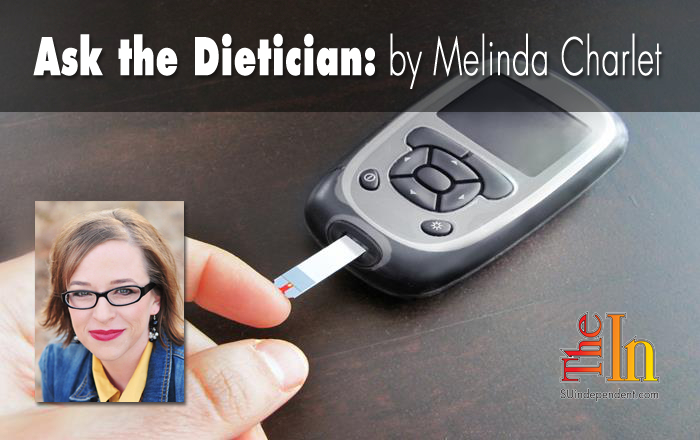Dear Dietician,
I just turned 40, and I have a strong family history of Type 2 diabetes. My dad was diagnosed with diabetes when he was 40, and I have recently started packing on some weight and am afraid that diabetes is just around the corner for me. Is there anything I can do now to prevent it, or am I a lost cause?
Sincerely,
Feeling Helpless
Dear Feeling Helpless,
It is understandable that you may be feeling helpless about your chances of developing diabetes. The number of people getting diagnosed with diabetes is increasing at an alarming rate. Type 2 diabetes used to be called adult-onset diabetes, but children and teens are also beginning to develop the disease in increasing numbers. You are right that having a family history and being overweight put you at a greater risk for developing diabetes. However, the good news is that for the most part it is preventable. If you take some simple steps now, you could defy the seemingly overwhelming odds against you.
Losing weight
Being overweight can make you as much as 40 times more likely to develop diabetes. But by losing as little as 10% of your body weight, you can cut that risk in half. This may seem easier said than done, but several of the changes that we will talk about next can help with the weight loss.
Exercise
Increasing your level of activity helps your body use insulin and glucose better and can decrease the risk of developing diabetes. You don’t have to run a marathon to get these benefits. Even if you just go for a brisk walk for 30 minutes a day, your chance of getting diabetes decreases significantly. So pick a sedentary activity, such as watching television, and replace it with something more active, such as walking your dog. Find something that you like to do so that you will stick with it. If you are not currently doing any exercise, start slow and work up to 30 minutes a day.
Diet
There are several dietary changes that can be made fairly easily that can help prevent diabetes. Replacing processed carbohydrates with whole grains is an easy way to improve your diet and reduce the risk of developing diabetes. Whole grains contain fiber that slows down how fast the food is digested, and decreases the insulin response. So put down that donut and eat a slice of whole wheat toast instead, or eat brown rice instead of white.
Another diet change that can have significant health benefits is cutting out the sugary drinks. Whether it’s soda, juice, or a pumpkin-flavored latte from your local coffee shop, replacing it with water, coffee, or tea (without the sugar) can help your cause. Recent studies have shown that even diet soda or beverages sweetened with artificial sweeteners can increase your risk of diabetes. So, drinking diet soda may not be a better alternative. If you are going to use a sugar substitute, try Stevia, which is a natural, non-caloric sweetener.
Replacing red and processed meats (such as hot dogs and bacon) with healthier protein sources such as fish, poultry, or nuts can lower your diabetes risk by 35%. This may be because of their high iron content (which affects how insulin works), or from the sodium and nitrates that they contain. So choose salmon instead of steak, or set aside one meal a week for a vegetarian entrée. These dietary changes may also help with the weight loss that we talked about before.
Stop smoking
If you smoke, you are about 50% more likely to develop diabetes than a non-smoker. Those aren’t odds I would be willing to take. So if you smoke, decide now to get the help that you need to stop.
Moderate alcohol
Studies have shown that moderate amounts of alcohol (up to one drink a day for women, and two drinks for men) can help your body use insulin more effectively and actually decrease your risk of diabetes. This is an instance where more is not better, though, so make sure to keep your intake moderate, and if you don’t drink, you don’t need to start. But a glass of wine with dinner may not be such a bad idea.
By making these changes in your lifestyle, you may be able to overcome your family history and the genetic odds that are against you, and significantly decrease your risk of diabetes. The best way to stop feeling helpless is to start being proactive and make positive changes now. This puts you back in control of your life. Even someone who doesn’t have a family history can improve their overall health by making these changes. So start moving, clean up your diet, and if you smoke, it’s time to quit.
If you feel like you need help with these dietary and lifestyle changes, talk to your doctor or friendly neighborhood dietician. And, as always, before making changes to your diet and exercise regimen, make sure you check with your doctor to make sure it’s safe.
Hopefully, you are feeling a little less helpless than you were before.
Healthy wishes!




